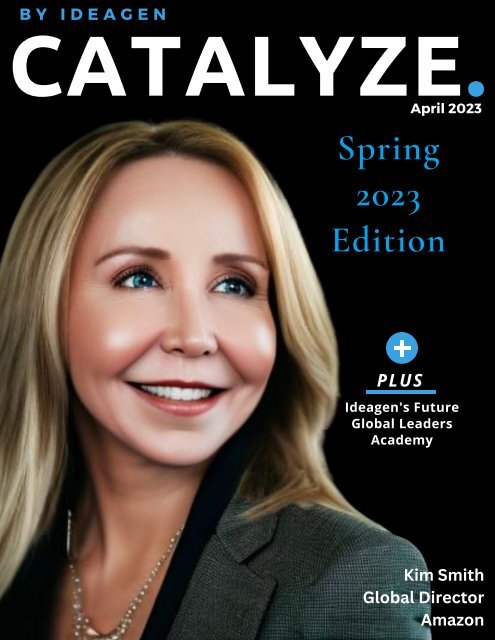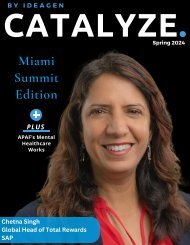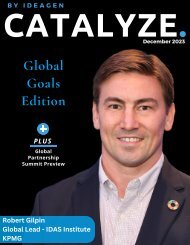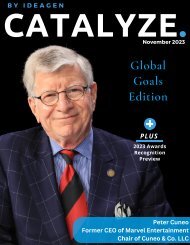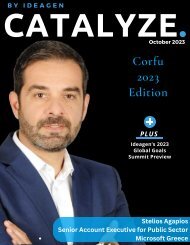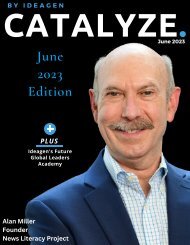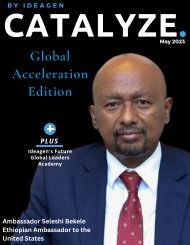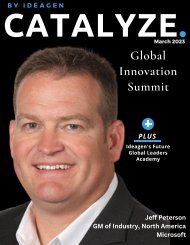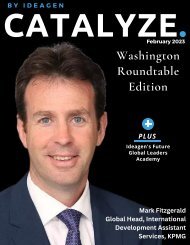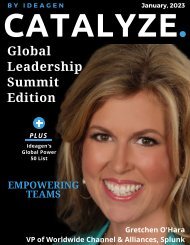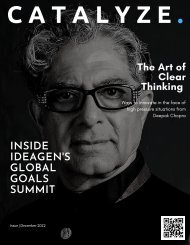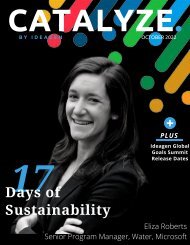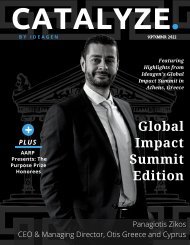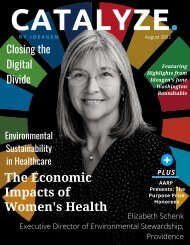Ideagen Global - Catalyze Magazine - April 2023
With Ideagen's extensive member network and influential platform, Catalyze Magazine serves as an aggregate for all the content, events, articles, and collaboration that we do. It is a monthly magazine where you will find transcriptions from Ideagen events, content, articles, and information surrounding how we are completing our mission. With this magazine, we want to highlight the nature of cross-sector collaboration and how we infuse it into our daily mission on a global scale. Ideagen's monthly Catalyze Magazine is back in 2023 with our April edition. Inside, view conversations we found impactful so far this year! This months covers features speakers: Kim Smith, Chetna Singh, Peggy Pelonis, Angelos Pangratis, Esteban Olivares, Gautam Mukunda, and Dave Grimaldi!
With Ideagen's extensive member network and influential platform, Catalyze Magazine serves as an aggregate for all the content, events, articles, and collaboration that we do. It is a monthly magazine where you will find transcriptions from Ideagen events, content, articles, and information surrounding how we are completing our mission. With this magazine, we want to highlight the nature of cross-sector collaboration and how we infuse it into our daily mission on a global scale.
Ideagen's monthly Catalyze Magazine is back in 2023 with our April edition. Inside, view conversations we found impactful so far this year!
This months covers features speakers: Kim Smith, Chetna Singh, Peggy Pelonis, Angelos Pangratis, Esteban Olivares, Gautam Mukunda, and Dave Grimaldi!
You also want an ePaper? Increase the reach of your titles
YUMPU automatically turns print PDFs into web optimized ePapers that Google loves.
B Y I D E A G E N<br />
CATALYZE.<br />
<strong>April</strong> <strong>2023</strong><br />
Spring<br />
<strong>2023</strong><br />
Edition<br />
PLUS<br />
<strong>Ideagen</strong>'s Future<br />
<strong>Global</strong> Leaders<br />
Academy<br />
Kim Smith<br />
<strong>Global</strong> Director<br />
Amazon
B Y I D E A G E N<br />
CATALYZE.<br />
Spring<br />
<strong>2023</strong><br />
Edition<br />
<strong>April</strong> <strong>2023</strong><br />
PLUS<br />
<strong>Ideagen</strong>'s Future<br />
<strong>Global</strong> Leaders<br />
Academy<br />
PLUS<br />
<strong>Ideagen</strong>'s Future<br />
<strong>Global</strong> Leaders<br />
Academy<br />
Chetna Singh<br />
Head of <strong>Global</strong> Total Rewards<br />
SAP
B Y I D E A G E N<br />
CATALYZE.<br />
<strong>April</strong> <strong>2023</strong><br />
Spring<br />
<strong>2023</strong><br />
Edition<br />
PLUS<br />
<strong>Ideagen</strong>'s Future<br />
<strong>Global</strong> Leaders<br />
Academy<br />
Peggy Pelonis<br />
President<br />
ACS Athens School
B Y I D E A G E N<br />
CATALYZE.<br />
Spring<br />
<strong>2023</strong><br />
Edition<br />
<strong>April</strong> <strong>2023</strong><br />
PLUS<br />
<strong>Ideagen</strong>'s Future<br />
<strong>Global</strong> Leaders<br />
Academy<br />
Angelos Pangratis<br />
Founder & President<br />
ALLILONnet
B Y I D E A G E N<br />
CATALYZE.<br />
<strong>April</strong> <strong>2023</strong><br />
Spring<br />
<strong>2023</strong><br />
Edition<br />
PLUS<br />
<strong>Ideagen</strong>'s Future<br />
<strong>Global</strong> Leaders<br />
Academy<br />
Esteban Olivares<br />
Head of Academics & New<br />
University Partnerships<br />
Summer Discovery
B Y I D E A G E N<br />
CATALYZE.<br />
<strong>April</strong> <strong>2023</strong><br />
Spring<br />
<strong>2023</strong><br />
Edition<br />
PLUS<br />
<strong>Ideagen</strong>'s Future<br />
<strong>Global</strong> Leaders<br />
Academy<br />
Gautam Mukunda<br />
Author, Research Fellow<br />
Harvard Kennedy<br />
School of Government
B Y I D E A G E N<br />
CATALYZE.<br />
Spring<br />
<strong>2023</strong><br />
Edition<br />
<strong>April</strong> <strong>2023</strong><br />
PLUS<br />
<strong>Ideagen</strong>'s Future<br />
<strong>Global</strong> Leaders<br />
Academy<br />
Sergio Fernandez de Cordova<br />
Executive Chairman<br />
PVBLIC Foundation
B Y I D E A G E N<br />
CATALYZE.<br />
Spring<br />
<strong>2023</strong><br />
Edition<br />
<strong>April</strong> <strong>2023</strong><br />
PLUS<br />
<strong>Ideagen</strong>'s Future<br />
<strong>Global</strong> Leaders<br />
Academy<br />
Dave Grimaldi<br />
Executive VP, Government Relations<br />
The Blockchain Association
K I M S M I T H ,<br />
G L O B A L D I R E C T O R<br />
A M A Z O N<br />
George Sifakis: What do you believe is the<br />
key to a successful team?.<br />
Kim Smith: Well, I think there are a few things. One, trust is the most<br />
critical. Having trust among the individuals working toward a common goal<br />
is so important, and that trust comes in many ways. The two most critical<br />
forms are, 'Can I trust you to bring out the best of what I need to be so that we<br />
can work together and get the compound interest of much more than what we<br />
would have achieved if it was just us individually?' Then 'can I trust myself to<br />
be able to show up as authentically, open, and as trusting as you need me to<br />
be so that, again, our compound value is much better than it would have been<br />
if we were separate?<br />
First and foremost, part of being authentic with myself and the teams that I've<br />
worked with in the past is being very upfront about what success looks like<br />
but allowing openness and giving people the roots and the wings to be able to<br />
choose the path to get to that way of success. It's having perspective and<br />
respect. It's a healthy respect for diversity of thought, neurological diversity,<br />
diversity of leadership, diversity of style, and diversity of experience. All<br />
those things matter, and being open enough to accept everything that<br />
someone can bring to the table so they can be their best selves, even if it's not<br />
something you completely understand or maybe even agree with, is pivotal.<br />
CATALYZE MAGAZINE | 1
CATALYZE MAGAZINE | 2<br />
K I M S M I T H C O N T I N U E D<br />
Kim: The second component I think is important, and it's not so much about<br />
teaching the teams how to do this; rather, it's about embracing the ability to accept<br />
rejection. The way I look at it is rejection is protection. If you're getting rejected in<br />
any way, shape, or form by a leader, by another member, by maybe someone who is<br />
not receiving what it is you have to offer and the way you have to offer it, it's an<br />
opportunity to take pause and say, is this individual or the situation or the scenario<br />
going to be the optimal one for the experience that I'm trying to drive? What's most<br />
critical about that is if you look at rejection in any way, shape, or form as an<br />
opportunity for you to be protected from what is coming at you; by absorbing that<br />
rejection and saying, 'this particular product or deliverable didn't meet expectations,<br />
why is that?' That's not a personal attack, but maybe I didn't bring my best self, or<br />
what can I learn so I improve upon where I'm going from here? It's protection from<br />
ultimate failure. It's protection to help you get to the point of success.<br />
All feedback is truly a gift and an opportunity to improve. But sometimes we can<br />
look at rejection if there's too much of it or if we are feeling overwhelmed by it as a<br />
sense of failure. It's difficult to bring our best selves to the table when there's a sense<br />
of too much rejection. You're taking in too much, or you're overstimulated by it for<br />
some reason. And what I've learned from that is no, no, no, when you are in a<br />
situation where the outcome isn't what you anticipated or isn't what was expected,<br />
whether it's losing a job or losing a team member, or losing a project or losing a<br />
customer, step back and understand that that experience is protecting you from<br />
larger failure points and giving you the opportunity to improve and truly bring the<br />
best of who you can be to the table.
I D E A G E N G L O B A L<br />
P R E S E N T S<br />
<strong>2023</strong><br />
GLOBAL<br />
ACCELERATION<br />
SUMMIT<br />
A S S E S S I N G T H E P R O G R E S S O F T H E U N<br />
S D G ' S A T T H E M I D W A Y P O I N T T O 2 0 2 3<br />
H O S T E D A T T H E E M B A S S Y O F E T H I O P I A<br />
S T R E A M I N G W O R L D W I D E 5 . 3 1 . 2 0 2 3<br />
<strong>Ideagen</strong>global.com | Presented <strong>Global</strong>ly by<br />
CATALYZE MAGAZINE | 3
DEFINING FAIR PAY AT SAP<br />
CHETNA SINGH: HEAD OF GLOBAL<br />
TOTAL REWARDS<br />
SAP<br />
George Sifakis: Could you kindly describe to the<br />
millions of people watching this interview what fair pay<br />
is and why it has been implemented at SAP?<br />
Chetna Singh: Absolutely! Thank you, George, for bringing such an important topic to our<br />
discussion. So let me start with fair pay, how you visualize it, and how you make it work. I will<br />
give you a very simple way of visualizing it. Imagine two stacks. The first stack is the foundational<br />
stack, which is about setting up objective and transparent compensation systems regardless of age,<br />
gender, ethnicity, culture, sexual orientation, identity, or work-life situation. That's the first layer.<br />
The second layer is all about aligning reward outcomes to individual impact and contribution.<br />
When you combine this together, that's fair pay. Fair pay is not about paying everybody the same,<br />
and many times I think that's how people get a little confused, but if you imagine these two layers,<br />
that's how we make it work in SAP. That's fair pay.<br />
Why has it been implemented in SAP? It's super simple. It creates a culture of inclusion and equity,<br />
it's how your customers or investors make their decisions, and it's also all about making us an<br />
employer of choice for our employees and external talent. It's all about what an organization stands<br />
for, and to me, if the foundation is weak, you can't build a stronger house. This is why it's so<br />
crucial for us at SAP.<br />
CATALYZE MAGAZINE | 4
CHETNA SINGH CONTINUED...<br />
George: And so, what criteria is taken into account when developing the fair pay system?<br />
Chetna: Sure. So let me talk in two dimensions, the qualitative dimension and the quantitative<br />
dimension. Qualitative is all about 'what do you want to stand for?' Is it about your culture of<br />
inclusion, equity, and performance? Do you want to give your employees an equal opportunity<br />
employer experience where their compensation experience in your organization is fair,<br />
transparent, and objective? Have they been equipped with the right tools for performance? How<br />
are the leaders doing their job? What are your organization's philosophies? How do you make it<br />
work on the ground? That's qualitative. The quantitative part is setting up a statistical system<br />
where you could do a regression analysis and identify people who go beyond the acceptable<br />
range of base compensation. If you combine these two together, those make the criteria for<br />
running a fair system in an organization.<br />
CATALYZE MAGAZINE | 5
THE SPECIFIC TYPES OF LEADERS<br />
DEVELOPED AT ACS<br />
PEGGY PELONIS<br />
PRESIDENT<br />
ACS ATHENS SCHOOL<br />
George Sifakis: Could you describe<br />
the specific type of leader you're<br />
looking to develop at ACS Athens?<br />
Peggy Pelonis: Yes, We think it's<br />
really important for somebody to<br />
observe and listen; and to really<br />
understand their environment. It's<br />
so easy to jump in and say, I<br />
know how to do things, I've done<br />
this, I've had experience, or I've<br />
done it in another situation, and I<br />
know how to do it. I'm not<br />
particularly a person who<br />
micromanages; I don't like to. I<br />
like to empower people to<br />
develop their own leadership<br />
style, and it's the same thing for<br />
students. We want to provide<br />
guidance, but at the same time,<br />
the most important thing is the<br />
kind of mindset that they're<br />
working from. How are students<br />
thinking about the world? How<br />
are they thinking about another<br />
human being?<br />
Peggy: The process of doing this<br />
actually develops the solution and<br />
then gives them the opportunity to<br />
say, 'Now that I have this solution,<br />
it's not only a question of telling<br />
people what to do, but how do I<br />
bring a team of people to work with<br />
me together?' So kids will actually<br />
take that initiative to say, 'Okay, I<br />
have this idea,' and then the next<br />
question is, 'Great, what do you<br />
need to make it happen, and how<br />
can I support that?' How are you<br />
going to get a team together to help<br />
you move forward with this? How<br />
are you going to inspire other<br />
people around you to come together<br />
so they can move with you and<br />
make this much more powerful and<br />
impactful?<br />
CATALYZE MAGAZINE | 6
PEGGY PELONIS CONTINUED...<br />
George: Incredible perspective, Peggy. As we look at leadership, could you<br />
kindly describe your specific leadership style?<br />
Peggy: Initially, I don't necessarily jump in. I like to take a lot of time to<br />
watch, observe, listen, and understand. Understand people's different<br />
learning styles, their different styles of being, and understand what makes<br />
people tick. What motivates them, what inspires them, what blocks them?<br />
Of course, this all comes with my psychology background, and initially, this<br />
takes some time, but once I get a sense of what's going on, then it's a<br />
question of how do I get everybody to work together here? I will talk about<br />
my vision. I will talk about where we want to go. I get feedback to see<br />
where everybody is and how we are going to get there.<br />
This is where we want to go. This is how I want you to think about this, but<br />
then in your specific area, what is your action plan to make this a reality?<br />
What is your goal in your specific area that aligns with my vision, and how<br />
are we going to move together in that direction? Then I watch and see. Are<br />
we moving in that direction in every area? In some areas, it's faster, and in<br />
some, it's slower, but I'll always go back and give feedback to people and<br />
say, I noticed this, and you did this really, really well. Here's an area I want<br />
you to think about, and that has to be frequent, and it has to be really clear<br />
because then people walk away knowing what they need to do to change<br />
something or what they need to continue to do, and at the same time reflect<br />
on how is all of this taking us closer to the goal. That's the kind of<br />
leadership style I have, and it helps me understand where people are coming<br />
from first.<br />
CATALYZE MAGAZINE | 7
Director of Product Marketing at Microsoft,<br />
Grace Clack, outlines the progress made from<br />
Microsoft's sustainability journey and the<br />
lessons learned to improve in <strong>2023</strong>.<br />
<br />
By utilizing data to understand the impacts of<br />
their initiatives and developing partnerships<br />
with like-minded organizations, Microsoft's<br />
sustainability commitments are generating<br />
impact within communities and creating<br />
competitive advantages.<br />
Grace Clack<br />
Director of Product Marketing<br />
Microsoft<br />
To read Grace's full blog post, click the link below!<br />
CATALYZE MAGAZINE | 8
THE MISSION OF<br />
ALLILONNET<br />
ANGELOS PANGRATIS<br />
FORMER EU AMBASSADOR TO THE WORLD TRADE<br />
ORGANIZATION & FORMER CHARGÉ D’AFFAIRES<br />
OF THE EU IN THE USA, PRESIDENT OF ALLILONNET<br />
George Sifakis: Ambassador Pangratis, could you tell us about the incredible work you're doing<br />
at ALLILON, why it was created, and perhaps most importantly, what is its core mission?<br />
Angelos Pangratis: Yes, George, of course. First, in order to understand what ALLILON is, it is<br />
important to understand the initial motivation that guided us in its creation. ALLILON was<br />
created by a group of Greeks several years ago in the US, and our aim and ambition at that time<br />
was to contribute to helping Greece emerge from its long-lasting crisis and to see Greece and<br />
Hellenism strengthened and on the path of progress and growth. In order to understand its core<br />
mission, it is also crucial to understand the three main goals of the ALLILON network, which are<br />
the following: First, the individual support to our members, especially to our youth in their<br />
professional endeavors. From postgraduate studies to professional insertion to career<br />
development and business initiatives, ALLILON is here to accompany the efforts of our<br />
individual members. It's important to understand that the youth are among the core victims during<br />
these many years of economic crisis. They suffered the greatest costs from this crisis because of<br />
the absence of development and the reduction of professional opportunities that an economy in<br />
difficulty offers to them. We talk about the many things that the crisis impacted in Greece, but I<br />
would argue that the biggest loss and most significant cost of the crisis was the lack of sufficient<br />
development potential of our youth because of the difficulties they face in the job market. So our<br />
main objective is to help our younger members deal with these challenges and to develop their<br />
professional prospects.<br />
CATALYZE MAGAZINE | 9
THE MISSION OF<br />
ALLILONNET CONTINUED<br />
Angelos: The second goal is to build a spirit of solidarity and mutual support among our<br />
members and the organizations we are cooperating with. I will explain later how we<br />
cooperate and with what kind of organizations in the wider Greek society.<br />
The third objective is to prepare. Prepare and adapt at an individual level or group level with<br />
the organizations we are cooperating with, and to the extent possible, at the level of the whole<br />
Greek society and the entire Hellenism; adapt to the quickly changing world.<br />
CATALYZE MAGAZINE | 10
IDEAGEN & SUMMER DISCOVERY'S FUTURE<br />
GLOBAL LEADERS ACADEMY<br />
FEATURING HEAD OF ACADEMICS & NEW UNIVERSITY PARTNERSHIPS AT SUMMER<br />
DISCOVERY. ESTEBAN OLIVARES, & DIRECTOR OF GLOBAL EDUCATION PROJECTS &<br />
PARTNERSHIPS AT UNESCO CENTER FOR PEACE, ROSIE CHAWLA<br />
George Sifakis: We're so excited to announce The<br />
Future <strong>Global</strong> Leaders program with Summer<br />
Discovery at Barnard College at Columbia University.<br />
Esteban Olivares with Summer Discovery and our very<br />
own instructor for the program, Rosie Chawla from<br />
UNESCO Center for Peace, are here with us. I'd like to<br />
ask you a few questions related to the course, so Rosie,<br />
what kind of speakers can we expect to see students<br />
engage with at this incredible future global leaders<br />
course?<br />
Rosie Chawla<br />
Esteban Olivares<br />
Rosie Chawla: Well, <strong>Ideagen</strong> is amazing because, as<br />
you know, we work with you on the course. Last<br />
year, students went to the UN building, and we<br />
spoke to what I like to call a really specialized expert<br />
on Micro-economies in Latin America, as well as<br />
other speakers that I arranged for students to get a<br />
different glimpse of what working on SDGs looks<br />
like. This year I hope to get the same mixture. I hope<br />
to get somebody at an in-depth level that works on a<br />
UN level or at a World Bank level. Combining those<br />
that we don't really know and hear about gives<br />
students the real picture and not a Hollywood view<br />
of what it's like to work on the SDGs.<br />
CATALYZE MAGAZINE | 11
FUTURE GLOBAL LEADERS COURSE<br />
CONTINUED...<br />
George: Let me ask both of you, what types of students can we expect to see<br />
in these programs? Where are they coming from?<br />
Esteban Olivares: Well, students are coming from everywhere. Usually, 40%<br />
of students in Summer Discovery are international students, which is<br />
amazing. Although, when we've had programs in New York City like last<br />
year, we had a lot of local students and a lot of commuters coming in, but we<br />
have students from everywhere, every single state in the country. We also<br />
work with organizations to ensure that we're bringing in students from all<br />
different backgrounds to take a seat at the table and be part of the learning<br />
that happens. Most specifically, there's a student who's going to read that<br />
course description and understand that this is about the UN SDGs and<br />
taking ownership of solving the SDGs. This is the type of student who<br />
understands they're going to inherit this responsibility to build the solutions<br />
to be part of that framework. I can be a lawyer, I can be a doctor, I can be a<br />
teacher, but I have a responsibility. So there's going to be those students who<br />
want to come and do it and to be amongst other students who are thinking<br />
about this, who are living and breathing this throughout the year, who are<br />
already building awareness about the UN SDGs. Maybe you're the only one<br />
in your neighborhood or the only one in your school, or the only one in your<br />
family who's really talking about this. You're constantly bringing this up to<br />
be around other students who are all excited about it. To have that<br />
community of people for the first time is an amazing experience. That's the<br />
type of student who's going to come and thrive in that course.<br />
George: And how can this be beneficial for college candidacy<br />
CATALYZE MAGAZINE | 12
FUTURE GLOBAL LEADERS COURSE<br />
PART 3<br />
Esteban: I think it's how the students are going to talk about the experience,<br />
how the experience transforms them, and why they chose to take on this<br />
opportunity when they could have done multiple other things throughout the<br />
summer. They chose this course, and I think how they speak about the topic<br />
they chose with their group and how they speak on the ideas of what they<br />
learned through group work. Maybe they didn't get along with everybody,<br />
but coming to a solution and a consensus is important. Even learning how to<br />
do laundry for the first time on your own or budgeting your own money is<br />
new.<br />
George: So it's college Preparatory,<br />
Esteban: It's college prep,<br />
George: Well, thank you, and The Future <strong>Global</strong> Leaders course will be<br />
coming to New York City, Barnard College, Columbia University. I'm here<br />
with Esteban Olivares from Summer Discovery, and Rosie Chawla,<br />
UNESCO Center for Peace, the incredible instructor at the <strong>Ideagen</strong> Future<br />
<strong>Global</strong> Leaders Course. You can find out more information at<br />
SummerDiscovery.com and at <strong>Ideagen</strong>global.com.<br />
CATALYZE MAGAZINE | 13
Join <strong>Ideagen</strong> and Summer Discovery July 23 to<br />
August 4th for the Future <strong>Global</strong> Leaders<br />
Academy!<br />
Future <strong>Global</strong> Leaders Academy<br />
Presented by <strong>Ideagen</strong>®<br />
Hosted at Barnard, Columbia University in New York City, The<br />
Future <strong>Global</strong> Leaders Academy brings students aged 14-18<br />
from across the globe to engage in hands-on projects that will<br />
tackle the United Nation’s 17 Sustainable Development Goals<br />
established in 2015<br />
Visit the Summer Discovery course page below to learn more<br />
CATALYZE MAGAZINE | 14
THE IMPORTANCE OF A<br />
LEARNING & INCLUSIVE MINDSET<br />
WITH AUTHOR GAUTAM MUKUNDA<br />
George Sifakis: What are some interesting<br />
mindsets of leaders and leadership you've<br />
encountered through your interviews<br />
with a myriad of leaders?<br />
Gautam Makunda: The mindset more than<br />
any other, and we talked about this earlier,<br />
but it's worth emphasizing, is this idea of a<br />
learning and inclusive mindset, and<br />
inclusive means that in the broadest sense<br />
of the word.<br />
Gautam: My friend and colleague Amy Edmondson, one of the greatest<br />
organizational behavior scholars who's ever lived, is the person who<br />
discovered what we call psychological safety. She looked at teams in a<br />
wide variety of environments and found that the strongest predictor of<br />
team success was psychological safety, better than the individual<br />
capability of the team and better than the resources of the team. It's<br />
essentially the sense that the people on the team felt that if they spoke<br />
up in a way that differed from the beliefs and preferences of the other<br />
members of the team, particularly the leader, they would not be<br />
punished. I want to emphasize that this is the strongest predictor of<br />
team success. Do people on the team feel psychological safety? Given<br />
that, the thing that I see in most successful leaders is someone who<br />
creates psychological safety by making it clear that they want to hear<br />
from people about their differences in opinion and perspectives.<br />
CATALYZE MAGAZINE | 15
GAUTAM MUKUNDA CONTINUED<br />
Gautam: I'll give you an example of that from the private sector. My<br />
pick for probably the best American CEO of his generation is Alan<br />
Mulally. He had an incredible career at Boeing, then rescued and<br />
turned Ford around so successfully that it was the only one of the big<br />
three that did not get bailed out in 2008. Alan had systems for how he<br />
led organizations, but his key was the idea that he got his top people in<br />
a room together on a regular basis, from daily to weekly, and the goal<br />
was for every person there to surface all of the problems that they had<br />
honestly and openly so that the other people on the team could<br />
contribute. Alan will tell you the story about how he knew he was<br />
starting to succeed at Ford when the third or fourth time he went<br />
around in a meeting, one of his people finally admitted that his division<br />
had a big problem. Up until that moment in time, everybody had been<br />
saying everything was great. Every one of our divisions is doing<br />
perfectly, and we have no issues. But Alan said, if everything is going<br />
perfectly, how come we're going bankrupt? That seems like a<br />
contradiction. Finally, one of his people says, 'I have this really big issue.'<br />
The way the story is told, that guy looked at the doors expecting<br />
security to come in and haul him out of the room to be fired because<br />
he had admitted a problem with the CEO. Instead, Alan said, 'Okay,<br />
let's all work together to solve it,' and turns out they could. He always<br />
highlighted this as a pivotal moment in the transformation of the<br />
organization, and it's one we should highlight. There are many<br />
different ways to lead, and every person has their own style, but<br />
successful leaders, the best leaders are the ones who can ensure<br />
everyone in the organization is willing to speak to them.<br />
CATALYZE MAGAZINE | 16
THE IMPORTANCE OF<br />
DATA TO ACHIEVE THE<br />
SDGS<br />
SERGIO DE CORDOVA, EXECUTIVE CHAIRMAN<br />
& FOUNDER, PVBLIC FOUNDATION<br />
George Sifakis: What are some of the<br />
current programs and, specifically,<br />
some key areas that you're looking to<br />
impact, change, and affect?<br />
Sergio Fernandez de Cordova : As I mentioned before, we have a collection<br />
of different initiatives and programs. To me, one of the most important ones<br />
is around data. The focus is on data for economic development and policydriven<br />
engagement to look at and understand what climate means, for<br />
example. What does climate mean to me in Sri Lanka? What does climate<br />
mean to me in Lithuania? What does climate mean to me in Australia? A lot<br />
of this off in the world of impact and advancing and looking at how we are<br />
advancing the Sustainable Development Goals, we have to focus on<br />
information and data as we're going into the midterms.<br />
As they say in the UN, this September is the halfway mark of the Sustainable<br />
Development Goals, and a lot of what we've been focused on since the idea<br />
of the Sustainable Development Goals was ratified in September 2015, from<br />
our perspective, has always been around the data. The media tells the story,<br />
and technology allows us to bring that information out, but gathering and<br />
focusing on the data is crucial. Additionally, getting governments and<br />
agencies to share that information has been a priority over the last seven<br />
years. We will continue to drive that and help educate governments on how<br />
they can understand that data, not from a commercial intent, but from a<br />
human rights perspective, from a human economic driven perspective, how<br />
to make their regions, their countries, their communities smarter, stronger,<br />
better, more impactful, and more effective.<br />
CATALYZE MAGAZINE | 17
SERGIO CONTINUED...<br />
George: I love the way you described that. The midterms for the global<br />
goals are certainly striking in terms of having been ratified by all 193<br />
member states in September 2015, as you mentioned. And here we are<br />
literally at the midway point, seven and a half years from that time<br />
before we launch into my next question, how do you feel about the<br />
achievement of those goals? Are you optimistic?<br />
Sergio: Achievement is a strong word. I think we're advancing the<br />
conversations, and there's not one shoe, you know, that fits all. There's<br />
not one size. I think what's happening is it's there are a lot of different<br />
ways. We have the private sector, NGOs, intergovernmental<br />
organizations, national leadership, and subnational leadership. I think<br />
we're at that point where I would dare say with great excitement that<br />
everybody is aware there's a way to do better. Everybody's aware that<br />
there's a framework, a mechanism. I look at the SDGs as a framework<br />
to advance universal connectivity for all. There is a roadmap that you<br />
could follow; you don't have to reinvent the wheel, and some folks are<br />
doing it. If you want to work and focus on education, or you want to<br />
focus on gender equality, or you want to focus on empowering women<br />
or reducing violence against women, some mechanisms exist, and now<br />
there are ways that one can engage. A lot of what we try to do is make<br />
sure that people know that these things exist. Right now, I feel like<br />
we've done the awareness and education needed. We've engaged, and<br />
now we need to start to activate more folks, and that includes the<br />
private sector, so they are aware of how to do better.<br />
CATALYZE MAGAZINE | 18
G L O B A L<br />
Sustainability and<br />
Innovation on The<br />
Blockchain<br />
Dave Grimaldi<br />
Executive VP, Government Relations<br />
The Blockchain Association<br />
George Sifakis: Sustainability is ubiquitous. Everybody talks about sustainability.<br />
How can blockchain help with that?<br />
Dave Grimaldi: That's a good question. We're telling the story about the future of<br />
payments and digital token creation, which is done by crypto mining. It's an energyintensive<br />
thing to create a token and have it run along the blockchain and be verified.<br />
One of the things that we're doing is explaining to members of Congress, especially<br />
more progressive ones, how we're partnering with local power grids, the Department<br />
of Energy, and the EPA, to work on how that sustainability plays a role in a <strong>2023</strong> and<br />
going forward, as this is something that's top of mind, especially for Democrats. That<br />
again has led to some uneasy learning moments with members of the House and<br />
Senate who are doubtful that we are mindful of sustainability, climate and energy,<br />
and environmental concerns. If you look at our flanks in terms of where our priorities<br />
are and the things we really want to explain right so that we get off on the right foot,<br />
that's one of them.<br />
George: Exactly, and as you're looking at regulation and oversight, how do you<br />
juxtapose innovation with all of this? How do you balance the two?<br />
CATALYZE MAGAZINE | 19
S U S T A I N A B I L I T Y A N D I N N O V A T I O N O N<br />
T H E B L O C K C H A I N C O N T I N U E D<br />
Dave: It's difficult because for companies in the new spaces to get off the ground, they<br />
need room to run. I opened and helped run the DC office for Pandora streaming, and<br />
Pandora wanted the same kind of room to run while they developed their music<br />
algorithm that helped them pick the next song by getting to know your musical tastes.<br />
The one thing that they wanted was just room to do that with intellectual property laws<br />
and digital transmission laws. So any company or industry is basically saying to DC,<br />
give us a little more room here. We'll stay inside the lines of existing laws, but let us get<br />
off the ground. It's the same for Google and the same for Microsoft. Explaining that<br />
innovation, though, is tricky.<br />
When members of Congress are presented with a meeting on blockchain and crypto<br />
issues, they'll say to their staff, is this a meeting on financial things or technology? Is it<br />
somewhere in the middle? That's where we are. We are right in the middle, and it's<br />
difficult for them to grasp right away, especially when you get into web3 issues and<br />
when your money is on a blockchain, you own it, but there is no centralized entity that<br />
controls it. It's a decentralized kind of ownership economy ecosystem. It's a difficult<br />
explanation for some of them to get. But we go slowly. And when you have a 30-minute<br />
meeting at the Securities and Exchange Commission or in the House of the Senate, you<br />
have to find that road to figure out what resonates.<br />
CATALYZE MAGAZINE | 20
I D E A G E N ®<br />
G l o b a l I n n o v a t i o n S u m m i t<br />
Streaming Now On <strong>Ideagen</strong><br />
<strong>Ideagen</strong>global.com | Presented <strong>Global</strong>ly by<br />
CATALYZE MAGAZINE | 21
Editor's Note<br />
Dear Friends and Colleagues, We are underway in this new<br />
year with a fresh start in <strong>2023</strong>, and there are numerous positive<br />
trends and advancements to be optimistic about. From<br />
breakthroughs in technology to inspiring advancements in<br />
sustainability, it's an exciting time to be alive. We are seeing<br />
communities come together in new ways with a renewed focus<br />
on changing the world. The world continues to evolve, with ai<br />
and virtual experiences becoming increasingly accessible and<br />
diverse, including the latest from ChatGPT and OpenAI.<br />
As we move forward into the year, it's important to celebrate<br />
these advancements and continue to strive toward a brighter<br />
future. At <strong>Catalyze</strong> <strong>Magazine</strong> by <strong>Ideagen</strong> <strong>Global</strong>, we are<br />
thrilled to be a part of this positive movement and can't wait to<br />
share all the exciting developments with our readers in <strong>2023</strong>!<br />
GEORGE SIFAKIS<br />
GEORGE SIFAKIS<br />
Editor-in-Chief & CEO<br />
-<strong>Ideagen</strong><br />
CATALYZE MAGAZINE | 22<br />
DANIEL KERNS<br />
Senior Editor <br />
ALEXA SIFAKIS<br />
Publication Co-Editor<br />
Pictured Top to Bottom<br />
George Sifakis & Rawle Andrews Jr.<br />
Craig Cookson, ACC<br />
Nasdaq Board Times Square


